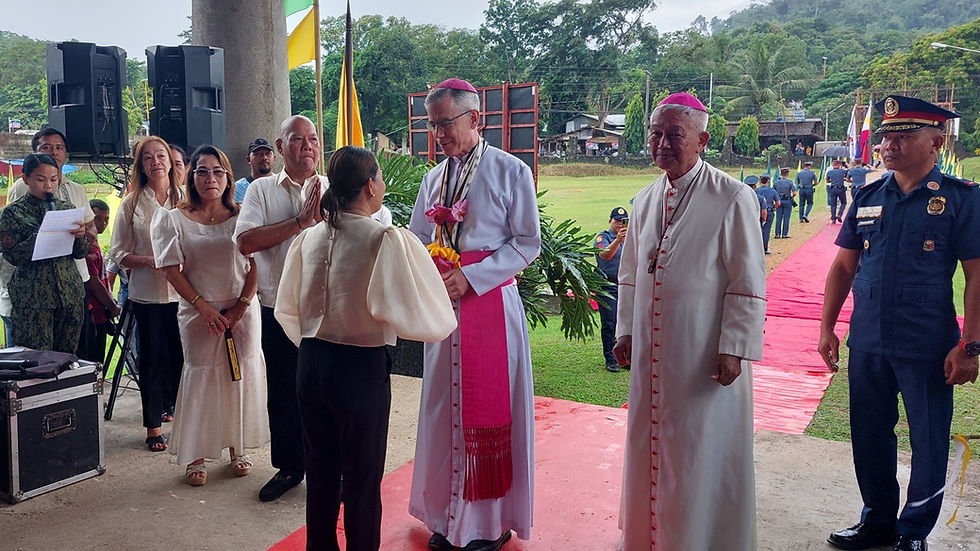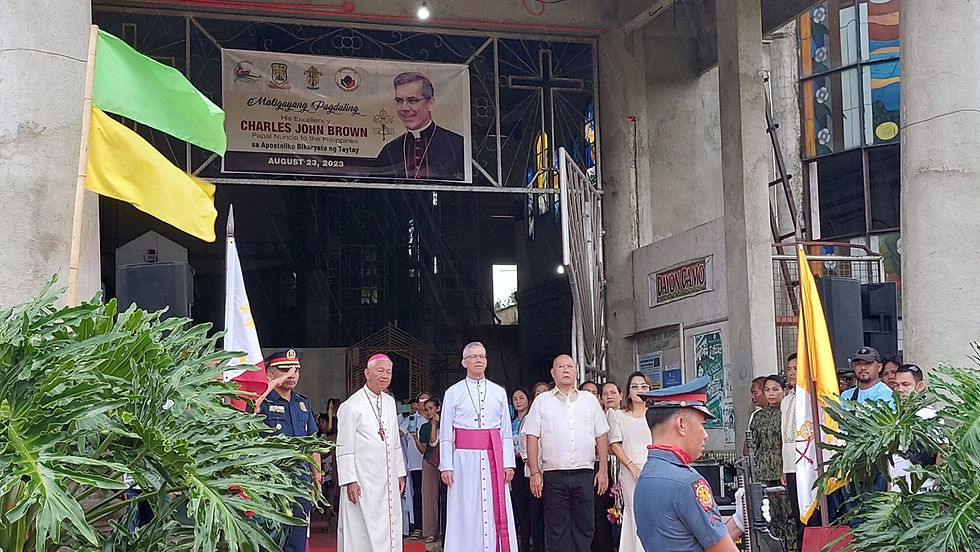The Gifts of Faith and Supernatural Life
- Dominus Est
- Aug 24, 2023
- 7 min read
Homily of H.E. Most Rev. Charles John Brown D.D., Apostolic Nuncio to the Philippines
August 23, 2023 | Wednesday of the Twentieth Week in Ordinary Time
St. Joseph the Worker Cathedral-Parish | Apostolic Vicariate of Taytay, Northern Palawan
Your Excellency, the Most Rev. Broderick S. Pabillo, D.D., Apostolic Vicar of Taytay; Bishop Edgardo Juanich, Emeritus-Apostolic Vicar of Taytay; concelebrating priests who have come in big numbers here to Taytay this morning, to celebrate with us in the cathedral: thank you men, for taking time, out of your busy schedules to be here with us this morning. Brothers and sisters in Christ, civic leaders here in Taytay, members of the Parish of Saint Joseph the Worker, the cathedral-parish here in Taytay:


It gives me so much joy and happiness as the Papal Nuncio, as the personal representative of Pope Francis, to be with you here this morning, as part of my Apostolic Visit to Palawan, which is happening in the context of the closing of your 400th anniversary celebrations for the arrival of Christianity here in Palawan. “Four hundred years of the gift of faith”, that is what you've been celebrating this year; and this jubilee celebration comes to a glorious conclusion tomorrow in Puerto Princesa, where I will be celebrating Mass. Thanking God for that gift of faith, that gift of Catholic life that has lived, grown, and developed here in Palawan for 400 years.
Let's reflect for a moment about our gospel (Mt 20:1-16) this morning, which is quite difficult for us to really understand from a human perspective. We heard the gospel read: a landowner, a rich person, is looking for workers in his farmland, in his vineyard. He goes out. He finds some workers early in the morning around 9:00, and says “Come to work in my farm, in my vineyard.” They come and start working at 9:00 in the morning. Then he needs some more work. He goes out at noontime, at 12 noon, finds some more men, brings them to the farm, to the vineyard. They start working at noon. Then later on at around 3:00 in the afternoon, he needs more workers. He goes out and finds some more men. They come and they all begin work. So, some started early in the morning, some started in the middle of the day, some started at the end of the day. Then, when the close of the work day comes, and the owner of the vineyard of the farm begins to pay the workers, he first pays the ones who just arrived a couple hours before. He gives them some money, and they get an amount. The ones who are working all day think, “Wow! We're going to get some more because we've been all day and these ones have only been working for one hour. We're going to get more.” But when they come, they get the same amount. It doesn't seem very fair from a human perspective. They begin to grumble and murmur and complain against the owner of the vineyard; and the vineyard owner, of course, says to them, “Listen, I agreed with you about the salary you would receive, and I'm free to do what I want. I'm free to be generous.” The culmination of the gospel is, “The last will be first, the first will be last.”
How do we understand this? This is not a model of social justice that you, as owners of farms, hotels, and vineyards, should be using. You should be paying your people justly based on how long they've worked, obviously. So, the Lord is asking us to think about this parable. What is he trying to tell us? He's trying to speak to us about what we celebrate for 400 years in Palawan: the gift of Catholic life, the gift of supernatural life, the gift of God's grace.
So, the gift of God's grace. When it comes into you at baptism, it's the same. It's the same, “amount”, we can say, the same gift. Whether you are six months old, or six years old, or sixty years old. Whether you've never gone to school, whether you're a university graduate. It doesn't matter. You get the same gift from God in baptism, the gift of Catholic life. We all receive the same “amount”, we can say, of life from God in baptism. So, there's a great equality in the Church. A great equality of God's grace. God treats everyone the same way.
When you come to faith, whether you're a little baby in the arms of your mother, or your godmother, coming to the baptismal font to receive God's grace, you receive the same. Whether you are six years old, or six months old, or whether, as I said, you are the leader of a big corporation in Manila, or a simple worker in Palawan, doesn't matter. You receive the same thing.
What are you receiving? The most precious gift we can imagine. The gift of life, of supernatural life. The gift of God's grace, which comes into you, which changes you, which prepares you for the life of heaven, which allows you to experience, even now walking on this earth, to experience a foretaste, a preview of heaven by God's grace. It's the same in each and everyone of us. That is what the Lord is trying to tell us. His gift is the same.
But now? There is a sense in which the gift is totally the same, but what makes us different is what we do with that gift once we have received it. Jesus has other parables about that, doesn't He in the gospel? About an owner who was going abroad and gave money to be invested, by some of his workers. Some invested it and got a nice return, and some invested it and got a halfway nice return, and some didn't do anything with the gift. They kind of brought back the gift in the same way that they had received it (cf. Mt. 25:14-30).
In those parables, Jesus criticizes and condemns those who haven't done anything with their gift. We all receive the same gift, but what we do with it is different, right? We need to allow God's grace to penetrate our lives. We need to allow God's life to live in us. That idea of life is so important for us as Catholics.
You live in a beautiful earthly paradise here in Palawan, with different forms of life all around you: ecological life, beautiful creation. We have beautiful trees, plants, grasses, fruits, and vegetables. We also have birds and fish. All of these things are alive with natural life. But in baptism, God gives you a different kind of life. Of course, all of us have a natural life. We receive it from our parents, right? In baptism we receive a new form of life, supernatural life, which we can also call God's grace, a new kind of life that's in us. What we need to do is to, we can say, invest with that life, use that life, allow that life to grow in us. How is that life growing? It's growing principally because we receive the Bread of Life, the Eucharist.
The Eucharist nourishes spiritual life in us, and makes that life increase so that we grow in life. We grow in the gift that God has given us. It gives us consolation and joy to receive the Eucharist, because the Eucharist is a supernatural life. It's interesting that Jesus chose bread, as the thing that He would change into His body to give a supernatural life. Normal bread.
Whenever we have breakfast, we have nice bread, right? That bread nourishes our natural life. It was very interesting on a natural level. I hope you understand me. On a natural level, every calorie that you eat, and sometimes we have to watch our calories, right? Count our calories. Every calorie that you eat on a natural level, on a biological level, it was something that was alive. Bread, grain, it was alive. You know? Pancit, grain, it was alive. Hamburger, the meat, it was alive. When we eat normal food, the life that was in the grain, or the durian, or whatever it was, that was alive, comes into us and it keeps us alive. Right? On a natural level.
The Eucharist does the same thing on a supernatural level. It gives a supernatural life. That's why God uses the symbol of bread to be transformed into His body and blood, the soul and divinity, to show us what bread does for us naturally, the Eucharist does for us supernaturally. It gives us His new form of life. So, at the end of our natural lives, when our biological lives begin to finish, and that happens to each and everyone of us, our natural lives come to an end; but if we are Catholics, if we receive the Bread of Life, that beautiful gift, there's another, kind of life that's in us: supernatural life. That life will carry us into heaven, into the life of the world to come, because that life never dies. It can only die by sin.
So, this is the gift that came to Palawan 400 years ago: the gift of supernatural life. It comes to us in baptism. The same. We receive the same wages, as we heard in the gospel today, but what we do with that initial gift is different. So, brothers and sisters, let's treasure the gift of supernatural life. Let's try to receive the Eucharist with great devotion and love, so that life can really permeate our existence, and make us what God wants us to be: His children, His sons and daughters. That's what it means to be a Catholic. To be part of the family of God, to be sons and daughters of our Heavenly Father because of Jesus, because of His life given for us on the cross, and transformed into our life through baptism and the Eucharist. This is the gift that came here 400 years ago.
So, for me as your Apostolic Nuncio, it gives me so much joy and happiness to be with you. Pope Francis has a great love for the Filipino people, as all of you know. As I told the people last night in El Nido, I’ll be going to Rome next month to see the Pope. When I go, I want to tell him that the people in Palawan, and more specifically the people in Taytay, are praying for him. So please pray for Pope Francis. He asks us to pray for him. He needs our prayers. He really relies on the prayers of the Filipino people.
As you celebrate this 400th anniversary, let's thank God for the gift of this Catholic life that's come into us through the sacraments. Let's thank God for the gift of Jesus. Let's thank God for the gift of Mama Mary, our Blessed Mother who was always watching over us, caring for us, leading us always to Jesus. As we receive Him in the Eucharist today, let's ask for that gift, to appreciate His life, and to spread His life around those who are close to us.
Transcribed by Joel V. Ocampo
photo and video clip from Apostolic Vicariate of Taytay, Northern Palawan


Comments